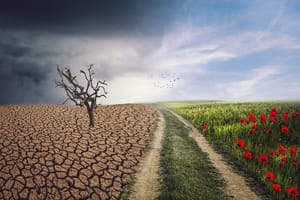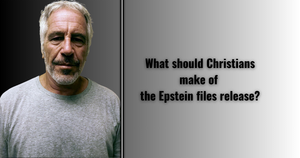Though the talking points have shifted a bit over the years, the issue of climate change is one of the biggest points of contention in modern society. Opinions are varied and range to extremes on either end of the spectrum. In many ways, political lines often serve as the separator between schools of thought. But how should Christians view climate change?
While there are many modern issues that divide Americans, the issue of climate change is one of the biggest. It is not a direct split across political party lines, but the Left and Right sides of the aisle typically do not align on the issue.
At its base level, climate change is something with which most people agree. There have been some changes to the Earth's climate that are impossible to ignore. However, the extent of climate change is where most disagreements are found.
On two extremes, some believe that the only real global shifts within climate change are cyclical and, thus, no big deal, while others have asserted the outlandish belief that the world could be uninhabitable within the next handful of years.
Most people fall somewhere in the middle, albeit typically much closer to one side or the other.
In this piece, we will look at some facts and observations about climate change, what the political Left and political Right have to say about the subject, and what the Bible teaches that should affect Christians' thinking on climate change.
Some facts about climate change
All statistics below are from recent studies conducted by NASA and the American Association for the Advancement of Science, unless otherwise stated.
- About 97% of climate scientists, regardless of political affiliation, argue that something is happening that can be classified as climate change. They do not all necessarily agree about what is happening or all of its causes, but they agree that there has been some society-related shifts that have had negative effects on the world's climate.
- Average temperatures and atmospheric carbon dioxide levels have risen sharply in the last 100 years. Estimates say that most of those numbers have been cyclical throughout Earth's history, but the carbon number (according to the estimates) is at an all-time high and could constitute an increase that is 250 times faster than any other point in history.
- The global average temperature has increased by more than two degrees Fahrenheit over the last 150 years. That could be part of a normal cycle of warming and cooling, but the rate at which the Earth has warmed appears to be outside of that normal cyclical pattern.
- Global sea levels have risen about eight inches in the last 100 years. During that time, the last 20 years have seen the starkest increase in sea level. The rate in the previous two decades is approximately double what it was 100 years ago.
- As part of climate change, the ozone layer has been heavily damaged. However, it could be recovering. According to the European Environment Agency, the year 2000 saw the hole in the ozone layer grow as large as 28.4 million square kilometers. As of 2024, that number had shrunk to 21.9 million square kilometers.
- A Clemson University study states that the 10 warmest years in recordable history have come in the last 10 years.
Some observations about climate change
- Some climate change statistics are based on unprovable estimates. This isn't to say that those estimates are wrong (most have plenty of evidence to support them), but they are not always 100% verifiable.
- Many used to refer to climate change as "global warming," but the phrase has been largely abandoned. While many scientists also believe in warming, climate change encompasses other effects, such as ozone depletion and ice cap melting.
- While overall temperature may or may not be increasing in a long-term sense, recent warming over the last 40 years has been more drastic than previous cycles of warming. This leads many to conclude that the trend will continue beyond previous cyclical "norms."
- With the increase of atmospheric pollution and other environmentally damaging activities since the Industrial Revolution, most environmental scientists have argued that climate change is primarily the fault of mankind.
- The American Medical Association contends that climate change is leading to negative consequences for human health, not just the Earth.
What the Left says about climate change
The majority of folks left of the political center advocate for human responsibility in fighting against climate change.
- Most Democrats and liberal-leaning citizens are extremely concerned with climate change. However, some have supported their stance with hyperbolic language. Former President Barack Obama said, "No challenge poses a greater threat to future generations than climate change" during his 2015 State of the Union address. Representative Alexandria Ocasio-Cortez once claimed in 2019 that the world would end in 12 years without a proper response to climate change (she later walked back that statement).
- In a 2021 speech, then-President Joe Biden promised that the United States would reach "net-zero emissions no later than 2050."
- Former Transportation Secretary Pete Buttigieg also said in 2021 that it is the responsibility of our society to prevent climate change when possible and defend against its effects when it is not possible. "We have to build resilient infrastructure that can withstand climate disasters, from hurricanes to wildfires," he said.
- Some on the Left want to eliminate the world's usage of fossil fuels, plastics, and other commonly used resources. They often have detailed plans for how to make that happen. However, that is a difficult ask, and they rarely are able to come up with a good way to pay for the projects or how to avoid significant job loss/job shifts in the process.
- Democrats (often correctly) criticize the Right for being far too unconcerned with climate change. Though some conservatives acknowledge a need for better environmental practices, in comparison to their liberal counterparts, rarely do Republican lawmakers push for significant reform to help limit the impact of pollution and other man-caused climate/environmental problems.
- Senator Bernie Sanders correctly stated that people have "a moral obligation" to leave the world in a suitable condition for the next generations. (More on that later)
What the Right says about climate change
The political Right is not completely against climate change, as a whole. However, many conservatives believe that it does not constitute a large-scale, global emergency.
- Conservatives are somewhat split on climate change.
- Some go as far as to refer to it as the "Climate Change Hoax." President Donald Trump has used that phrase, and former Oklahoma Senator James Inhofe famously brought a snowball into a session of Congress to do the same. Trump has softened that stance a bit but did remove the US from the Paris Climate Accord.
- Others, like former Vice President Mike Pence, acknowledge "the climate is changing," but deny that it is something that should send people into a panic.
- Most on the Right do not view climate change as an urgent matter.
- In opposing sweeping reforms related to climate change, many Republicans bring up relevant counterpoints. For example, they argue that modern society relies on certain fossil fuels, and to shift away from that would cost too much money and too many jobs. Senator Ted Cruz called the previously proposed Green New Deal "a job-killer." They also contend that other nations (especially several countries in Asia) are much more problematic for the environment than the United States.
- Conservatives often cite the hypocritical nature of liberal politicians and other wealthy democrats who preach about climate change. Many of these individuals fly in private jets, drive around in large gas-powered motorcades, or have significant financial stakes in large companies that pollute heavily.
What the Bible says
It is worth noting that there is nothing within the pages of Scripture that directly addresses the modern issue of climate change. However, there is plenty of biblical application within the pages of God's Word that Christians should consider when thinking about the subject.
The Earth belongs to the Lord, and it is valuable.
Everything within the Earth, including the Earth itself, belongs to God. Psalm 24:1 says, "The Earth is the Lord's and the fullness thereof, the world and those who dwell therein, for He has founded it upon the seas and established it upon the rivers."
In that creation, there is a clear hierarchy of importance, as the Lord makes it clear that He cares most for those made in His image (people), then other living things, and then the rest of creation. However, He intentionally gives purpose and value to every part of that creation. In Revelation 4:11, the Apostle John states, "Worthy are You, our Lord and God, to receive glory and honor and power, for You created all things, and by Your will they existed and were created."
In the creation narrative of Genesis 1, Moses wrote that God considered His creation "good" or "very good" seven different times.
The late evangelist Billy Graham once said, "Why should we be concerned about the environment? It isn’t just because of the dangers we face from pollution, climate change, or other environmental problems—although these are serious. For Christians, the issue is much deeper: We know that God created the world, and it belongs to Him, not us. Because of this, we are only stewards or trustees of God’s creation, and we aren’t to abuse or neglect it."
The Lord has delegated a certain stewardship role to mankind that requires people to take care of the world around them.
The Bible says in Genesis 2:15, "The Lord God took the man and put him in the Garden of Eden to work it and keep it."
In the Garden, God gave Adam the explicit responsibility to take care of the land. With that, He also granted dominion and leadership over the land. In simplest terms, that means that Adam–and mankind today–have been put in a position of leadership and authority over creation to oversee that it thrives. When the people of the world do not take care of the world in which they live, they fall short of that directive from God.
Psalm 8 showcases this dominion, as well, but it also gives some insight into why the Lord has granted it: He wants His people to receive constant, clear expressions of His glory. "O Lord, our Lord, how majestic is your name in all the Earth!" (Psalm 8:9).
In contrast to these passages, the Lord, in Revelation 11:18, uses the description "destroyers of the Earth" as a way to label His enemies.
To neglect the duty of caring for the world, Christians would be in grievous sin against God.
Creation is a direct reflection of the Creator, and Christians must do their part in making that reflection one that clearly reflects God's glory.
The Lord has revealed Himself to the world through His creation. Paul makes that very clear in the first chapter of Romans. The beginning of Romans 1:20 says, "For His invisible attributes, namely, His eternal power and divine nature, have been clearly perceived, ever since the creation of the world, in the things that have been made..."
That idea is not just a New Testament concept. The Psalmist also writes, "The heavens declare the glory of God, and the sky above proclaims His handiwork" (Psalm 19:1).
Because of that, it is fair to say that the chief function of God's creation (including mankind) is to reflect the glory of the Lord to the rest of creation. Stewarding well is an obvious element of doing that.
Sin affects all of creation, and all of creation needs to be redeemed. One day, it will be.
In the first two chapters of Genesis, the state of the world was one of perfection. Then, in Genesis 3, sin entered the picture, and the curse of sin not only affected the people but also the rest of the creation.
The picture of God's judgment in Isaiah 24 includes phrases like "the Earth mourns and withers," "the world languishes and withers," and "a curse devours the Earth" as a direct result of sin.
Romans 8:19-22 shows that the Lord made every aspect of creation–not just mankind–with an innate desire to "be set free from its bondage to corruption."
The Lord promises redemption for the entirety of creation. Though there is no salvation for the soulless, Christ still reconciles the cursed creation to Himself. Ephesians 1:10 says that the Lord will "unite all things in Christ, things in Heaven and things on Earth in Him."
Passages in Isaiah 65-66, 2 Peter 3, and Revelation 21-22 speak about "new Heavens and new Earth," foretelling of the Messiah's work in redeeming all of creation.
God cares for all of His creation.
Even in a passage about anxiety within Jesus' "Sermon on the Mount," the Lord demonstrates his love for creation. "Therefore, I tell you, do not be anxious about your life, what you will eat or what you will drink, nor about your body, what you will put on. Is not life more than food, and the body more than clothing? Look at the birds of the air: they neither sow nor reap nor gather into barns, and yet your heavenly Father feeds them. Are you not of more value than they? And which of you by being anxious can add a single hour to his span of life? And why are you anxious about clothing? Consider the lilies of the field, how they grow: they neither toil nor spin, yet I tell you, even Solomon in all his glory was not arrayed like one of these. But if God so clothes the grass of the field, which today is alive and tomorrow is thrown into the oven, will He not much more clothe you, O you of little faith?" (Matthew 6:25-30).
A few chapters later, the disciple formerly known as Levi writes in Matthew 10:29, "Are not two sparrows sold for a penny? And not one of them will fall to the ground apart from your Father."
Psalm 145:9 says, "The Lord is good to all, and his mercy is over all that He has made." Psalm 104, Job 38-39, Jonah 4:11, and Colossians 1:16-17 also demonstrate this idea.
Christians are morally obligated to "do their part" in passing along a healthy world to the next generations.
In Proverbs 13:22, the Lord details the importance of leaving a good inheritance to one's children. A good world to live in certainly would qualify. "A good man leaves an inheritance to his children's children, but the sinner's wealth is laid up for the righteous."
The first command in Scripture came in Genesis 1 when the Lord instructed Adam and Eve to "be fruitful and multiply" and to "have dominion" over the Earth. These two ideas are not separate but are part of one larger command from God.
While the urgency of climate change is somewhat up for debate, what is not arguable is the fact that mankind needs to do a better job of preserving this world for the future children of God.
Panicking or exaggerating issues does very little to help the fight against climate change, and the same is true for ignoring it altogether. Part of the Church handling itself well in this sphere is finding the proper balance of concern while working to be the best stewards of the land God has given.
Final verdict
Discussing climate change can make for a tricky conversation. However, no matter to what extent a person believes the world is suffering, it is an inarguable fact that there are some ways in which people can better take care of the Earth.
Intentionally preserving and keeping the world around us is a basic duty of God's people. When God granted mankind dominion over the rest of creation, He also gave man this responsibility. That responsibility must not be met with begrudging resistance but joyful obedience.
As image-bearers of the Creator, Christians are called to reflect His character by stewarding creation well.
By taking care of the Earth, Christians honor God, love their neighbors, and leave a legacy for future generations. Creation care is, ultimately, an act of worship and obedience to the One who made all things good.




